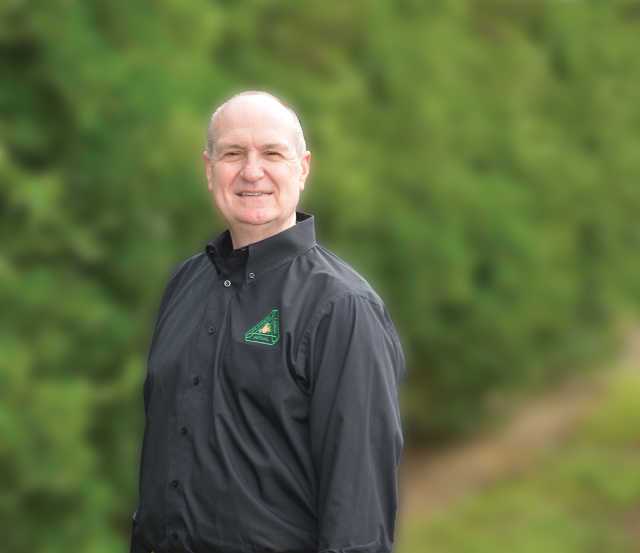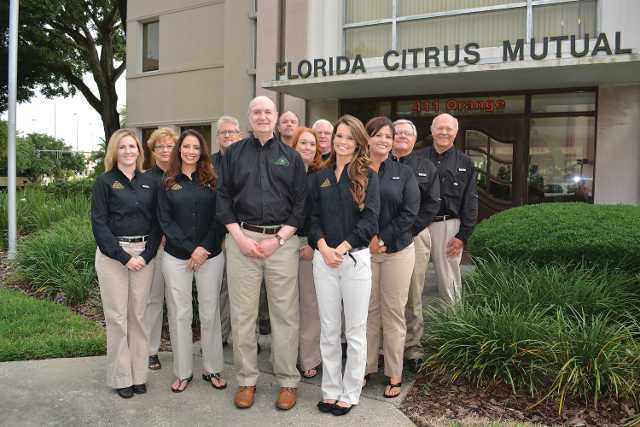Florida Grower Selects 2014 Citrus Achievement Award Winner

Mike Sparks, Florida Citrus Mutual. Photo by Frank Giles
The political process has been jokingly referred to as similar to making sausage — it is better to see the laws, not how they are made. It is hard work that often goes with little thanks and always an uncertainty of how political winds will blow.
In November 2010, it was becoming clear that the fight against HLB was shaping up to be a life-and-death battle for Florida’s citrus industry. That month, a group of industry stakeholders gathered in the offices of Florida Citrus Mutual to hash out research-related goals to help the industry survive the spread of the endemic disease.
In summary, the goals sought to secure dedicated, significant, and long-term funding for research into citrus diseases and pests. Nearly four years of hard work later and a few detours along the way, this was achieved with the signing of the 2014 Farm Bill. The bill directs $125 million in mandatory spending for citrus research over the next five years.
It is a huge shot in the arm to an industry in dire need of good news. Inclusion of a citrus-only provision took stakeholders throughout the industry to step up and advocate on behalf of not just Florida citrus, but also California and Texas.
It took a maestro of a million moving parts to manage and keep up with all the different factions that came into play in this political process. That maestro is the 2014 Florida Grower Citrus Achievement Award winner — Mike Sparks, the executive vice president and CEO of Florida Citrus Mutual.
“To my mind, the passage of the 2014 Farm Bill with this citrus provision is one of Florida Citrus Mutual’s greatest achievements,” Sparks says. “It truly couldn’t have been accomplished without a unified front of growers, researchers, lawmakers, lobbyists, and our staff here at Mutual working toward our goal.
“We’ve placed our faith in research to find long- and near-term solutions to greening. We were all in for dedicated, significant, and long-term funding. I was fortunate to be in sort of an air traffic controller role as the process played out.”
A Look Back
According to Sparks, it is worth looking back in time to appreciate how citrus was able to carve out a dedicated place in the Farm Bill — a feat never accomplished before. First and foremost, his 40-plus years working in the citrus industry was significant in building the needed relationships for the Farm Bill fight. Those years taught him the critical importance of grower involvement and oversight.
“Before joining Florida Citrus Mutual, I worked for more than 30 years with the Florida Department of Citrus (FDOC), holding just about every administrative role in the agency,” he says. “The FDOC gave me a great opportunity to work closely with 30 years’ worth of Florida citrus commissioners. It really allowed me to get to know the growers and processors and their concerns, and set me up well for my new work at Mutual, which started in 2006.”
Sparks says the industry made a wise decision going back to the box tax days to insist on grower oversight on funds.
“This concept of grower oversight has continued with the Citrus Research and Development Foundation (CRDF), which is hugely important,” he says. “The CRDF board of directors and other committees are made up primarily of growers. Their very livelihoods and generations of their families have depended on Florida citrus. By its very nature, you know they are going to make smart decisions when it comes to the survival of this industry.”
In the early days of HLB research, it was described as a Manhattan Project scenario because very little was known about the disease.
“We called the areas we were focusing on stovepipes of research,” Sparks says. “We were looking at the psyllid, trying to understand the disease itself, and seeking a resistant tree in the future.
“In recent years, we’ve seen some redirection of research funds to focus on what can be done now to keep these trees productive. If we can’t keep these trees productive today, we’ll never get to that tree of the future. The redirection of these dollars is an excellent example of stakeholder oversight of the CRDF and its allocation of resources. Those growers on the board have the sense of urgency to survive. You might not get that from some bureaucrat.”
Greening Goes Mainstream
The plight of citrus growers dealing with citrus greening has been covered extensively by the mainstream media in the past year. Major outlets like New York Times, USA Today, NPR and many others covered the story. According to Sparks, the news coverage didn’t happen by accident.
“Florida Citrus Mutual put out news releases and did hundreds of interviews to make sure this message was heard across the nation,” he says. “And, you can bet every time one of those stories hit, we put them in front of those legislators we needed to support our efforts.”
Sparks says the media strategy will now shift toward getting the message out with research funding in place, solutions to greening are on the way. “I am optimistic we will whip this disease,” he says. “We will communicate to the media the battle is not over, but our industry was built on high-quality fresh fruit and juice. We will never lose that quality and will win this fight.”
Come Hell Or High Water
With an innovative structure like CRDF in place, the attention turned to securing new funds to help supplement the investment growers have put into place.
“You have to remember that growers really stepped up and funded $70 million in research out of their own pockets over the last seven years,” Sparks says. “That put a tremendous financial burden on them. The Citrus Commission stepped up to help fund more research, but that was to the detriment of citrus marketing and advertising programs. So, we were all hands on deck to seek new revenue potential.”

Mike Sparks says Florida Citrus Mutual’s staff is made up of highly qualified people and deserve credit in the Achievement Award honor as well. Photo by Frank Giles
In November 2010, Sparks and other stakeholders started investigating how to leverage political power to establish a research trust fund and avoid raiding advertising taxes. A strong alliance was formed among the Citrus Mutual organizations in Florida, California, and Texas in order to boost the industry’s lobbying power.
The original plan was to establish a trust fund that would be financed by the citrus tariff. This required entirely new legislation. Florida Citrus Mutual took a leadership role in crafting the legislation with the help of its lobbying firm Akin Gump.
The program was modeled after the Wool Trust Fund and would have collected a third of the citrus tariff to fund research at $80 million over five years. After a lot hard work and negotiating, a bill was crafted and ready to go both in the U.S. House and Senate. “We had the entire Florida delegation in the House on board both Republican and Democrat, which is pretty remarkable in today’s environment,” Sparks says.
There was just one problem. With so much gridlock in Congress, there was no legislation in sight to which the citrus research trust fund legislation could be attached. “We needed a larger international trade vehicle to hook our bill to — one that the President and Congress would support. But, let’s be honest, I can count on one hand how many bills have passed through both the House and Senate in the past four years.”
With no legislative vehicle in sight, Sparks and his team shifted their attention to new a approach to obtain funding.
“We had to give up our personal pride on the tariff,” Sparks says. “We had built a turnkey piece of legislation, a funding source, and a bill ready to go. It was heartbreaking to throw that away, but we had to move on to the next opportunity.”
Last year, the new opportunity came in the form of the Farm Bill. All the lobbying and convincing had to start anew to get others besides citrus state lawmakers on board for support. “We wanted to take the good parts of the trust fund idea into the Farm Bill,” Sparks says. “An important part of that was keeping stakeholder oversight in managing funds — five from Florida, three from California, and one from Texas.”
Sparks says he can’t thank enough the entire industry for stepping up and helping to lobby for passage of the citrus provision in the Farm Bill. Coca-Cola and Pepsi, influential growers, Mutual’s board of directors, and the Florida Congressional delegation all got involved.
“Sen. Bill Nelson was really our go-to guy through the years of fighting for this,” Sparks says. “Florida Congressional representatives Vern Buchanan, Tom Rooney, Dennis Ross, Daniel Webster, Mario Diaz-Balart, Debbie Wasserman Schultz, Kathy Castor, Patrick Murphy, and Steve Southerland all were key allies.
“In the final days, it was our Agriculture Commissioner Adam Putnam who traveled to Washington and made calls to help bring it home.”
President Obama signed the Farm Bill on Feb. 7. It will provide a total of $125 million ($25 million for five years) of mandatory spending. “If those dollars are not spent, it carries over to the next year,” Sparks says. “And, that’s not all, there is another $125 million that would be potentially available through discretionary funding.[mmw-video id=”60323″]
“That meets our goal set back in 2010 of dedicated, significant, and long-term funding for disease research. I feel privileged to have been a part of managing this process and working with so many excellent citrus stakeholders. It was an extremely detailed and difficult process, but our industry needed a new infusion of funds desperately.”
Industry Attaboys

Mark Wheeler
Grower And Current Florida Citrus Mutual President
“Mike has a tenacious spirit, which fuels his relentless pursuit of any challenge placed before him, combined with a strong streak of diplomacy that enables him to navigate even the most delicate of situations. Based on my experience, to find someone with both these skill sets is extremely rare because they tend to be offsetting. I hope this recognition highlights to Florida’s citrus growers Mike’s capabilities and helps illustrate the tremendous benefit he’s been to our industry.”

Fran Becker
Peace River Citrus Products
“Mike fully understands the incredible challenge that we face as an industry today with the threat of HLB. Getting the money secured for HLB research in the Farm Bill was a major achievement and one that is deserving of the Citrus Achievement Award. We began working on this initiative back when I was president of Florida Citrus Mutual. There were countless times when it looked as if we should give up and focus on something else, but true to Mutual’s motto — ‘Focused, Committed and Making a Difference’ — that is exactly what Mike did.”
 Words From The Sponsor
Words From The Sponsor
With an overwhelming outpouring of support, Mike Sparks has been named the 2014 Citrus Achievement Award winner. Congratulations to Mike for his dedication, hard work, and vision for the future! These qualities are the hallmark of true leaders. And, it is this unmistakable passion for what they do that makes these individuals such an inspiration to those around them. The citrus industry has advanced and overcome significant challenges as a direct result of devoted individuals like Mike and their willingness to go the extra mile — or 10.
Chemtura AgroSolutions applauds Mike for his citrus industry commitment, dedication, leadership, and his perseverance to find solutions for critical industry challenges. A special thank you also goes out to all 2014 nominees and the dedicated citrus grove managers and growers passionate about what they do. It is a privilege and honor to work with you in providing long-lasting, crop-protection solutions and serving this important industry.
*Sparks will be presented the award on June 12 at the Citrus Industry Annual Conference.










